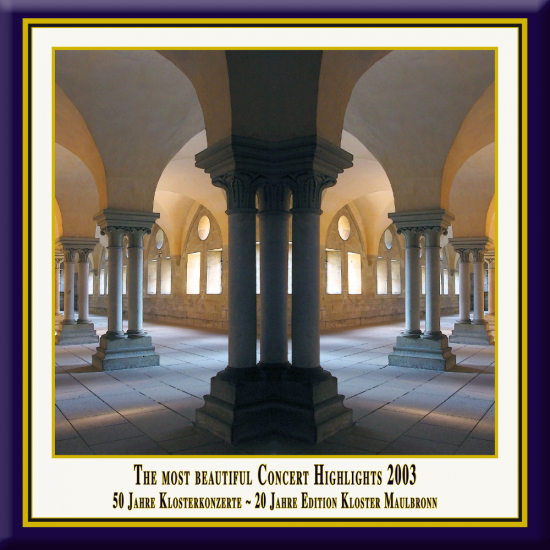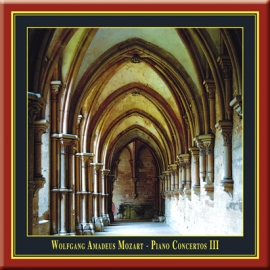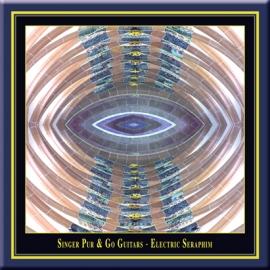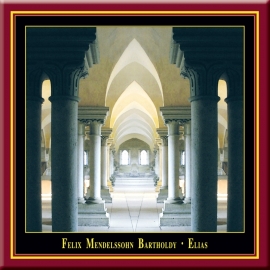Vol. 06: The most beautiful Concert Highlights 2003
The most beautiful Concert Highlights
from Maulbronn Monastery 2003
The 50th Anniversary of the Maulbronn Monastery Concerts
Anniversary Series, Vol. 6
Highlights from:
George Frideric Handel:
Solomon, HWV 67
(September 27 & 28, 2003)
Wolfgang Amadeus Mozart: Piano Concerto No. 20 in D Minor, K. 466
(July 11, 2003)
The concert "Electric Seraphim · New soundscapes for voices and electric guitars":
Perotinus: Sederunt Principes
& Matthäus Pipelare: Memorare Mater Christi
(June 18, 2003)
Felix Mendelssohn:
Elijah, Op. 70
(May 17 & 18, 2003)
Live recordings from the church of the German
UNESCO World Heritage Site Maulbronn Monastery
HD Recording · DDD · Duration: c. 118 Minutes
Digital Album · 30 Tracks · incl. Digital Booklet


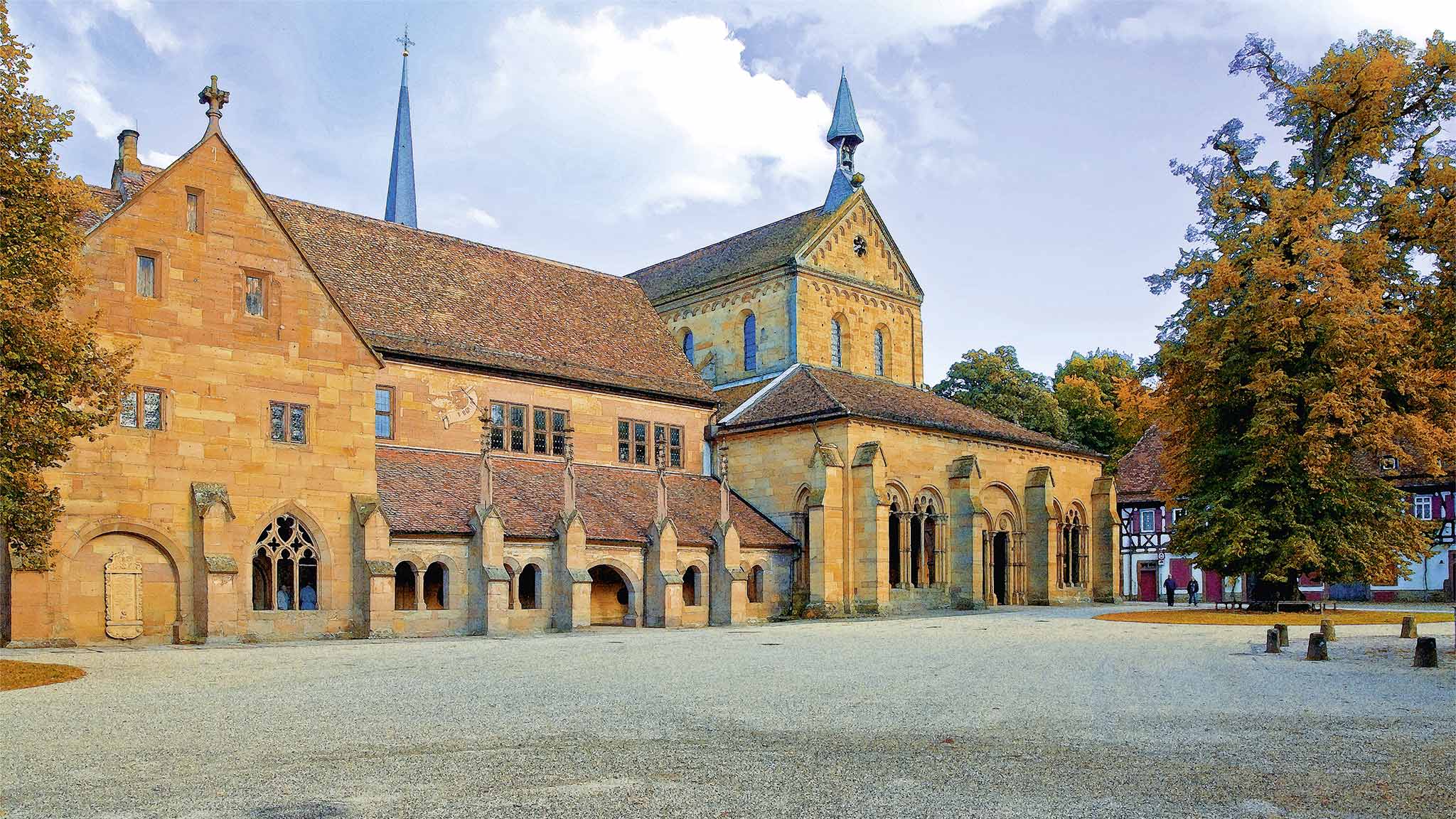
W
e have been documenting for 20 years the concerts at the UNESCO World Heritage Maulbronn Monastery. The concerts supply the ideal conditions for our aspirations. It is, above all, the atmosphere of the romantic, candle-lit arches, the magic of the monastery in its unadulterated sublime presence and tranquillity that impresses itself upon the performers and audience of these concerts. Renowned soloists and ensembles from the international arena repeatedly welcome the opportunity to appear here - enjoying the unparalleled acoustic and architectural beauty of this World Heritage Site, providing exquisite performances of secular and sacred music, documented by us in our Maulbronn Monastery Edition.
Josef-Stefan Kindler & Andreas Otto Grimminger, K&K Verlagsanstalt

Solomon by George Frideric Handel (1685-1759)
In the summer months of 1748 Handel composed the two oratorios "Solomon" and "Susanna" for the ensuing season. He started on "Solomon" on 5th May 1748 and terminated the score on 13th June 1748 with the devotion S.(Soli) D.(Deo) G.(Gloria). The work is considered a link to Handel's later oratorios. His earlier oratorios are coloured with political affairs and allusions, as in his famous oratorio "Judas Maccabaeus", inspired by the Scottish rebellion of 1745. "Solomon" depicts a wise and god-fearing ruler, with Solomon's court presenting the image of an ideal society. The central theme of the libretto has its origin in narratives from the Old Testament: the Book of Kings (1st Kings 1-11) and the Chronicles (2nd Chr. 1-9), among others. Despite this, one ascribes this oratorio not only aspects of the Judeo-Christian tradition, but also a pantheistic world view, in which God is to be found in all aspects of life. The different qualities of King Solomon are demonstrated and celebrated in the various acts of the oratorio. It is often suggested that Handel wished to extol the golden age of England and its ruler, George II who had granted him English nationality. Handel praised the glory of England and its monarchs with this oratorio by equating them with Israel and King Solomon. He used a, for that time, very large orchestra and was able to use the unparalleled expressive possibilities in his depiction of "pomp and circumstance". The oratorio is not distinguished with a dramatic plot, but rather contains juxtaposed pictures and scenes. The ensuing static impression that emerges is balanced by the richness of colour in the individual tableaus. The different scenes and events allow Handel to use his whole palette of compositoric expression. Differentiated instrumentation, large choral pieces, soloistic elements and sensitive musical character studies demonstrate Handels great artistic ability. With two choirs and seven eight-voice choir parts he exhausts all at that time existing composition possibilities. By casting "Solomon" with a countertenor he uses opera's tradition of elevating heroes abounding with nearly supernatural strength and wisdom into the superhuman by using feminine voices.
In Act I, Solomon appears as a God-fearing King, celebrating the finishing of the temple in Jerusalem with his people, following which we see the love to his wife, his generosity, his gentleness and fidelity. Powerful, jubilant choirs bear witness to the court's splendour and glory. The passage in the text "till distant nations catch the song" from the choirs' With pious heart is composed very vividly by Handel. The numerous fugal entries mirror the different nations that spread God's message. The act ends with the royal couple's retreat into the bedchamber accompanied by a soft background choir. Nightingales (flutes) and warm breezes (deep rustling of the violins and violas) enhance the twilight atmosphere.
In Act II, the famous story of Solomon's wise judgment is told. A servant brings the petition of two dissenting women who are seeking the King's judgment. It is revealed that both women have given birth to a son. It is asserted that one of the sons died in the night and the mother swapped her dead son with the other woman's child. Both now claim to be the true mother and denote the other a liar. In this difficult situation, Solomon uses a clever ruse. He proclaims the child should be cut in two and each woman should be given one half. While one of the women consents, the other woman desperately asks him to spare her innocent child. She would rather let the other woman have him than to see him die. Thus Solomon recognizes in her sorrow and despair the true love of a mother and returns the child to her. The musical high points in this act are primarily the portrayals of the main figures, with distinctive motifs being assigned to each individual. Hard, syncopated rhythms characterize the envy, the inner turbulence and the wickedness of the childless woman, whereas the other woman, seeing her child in great danger, is accompanied by dotted figures in the bass line, which form the basic atmosphere of gnawing fear. Dissonant suspensions and modulations increase this fearful tension, until the difficult decision "take him all" leads to a resolution in major with a simultaneous, descending, mournful bass line. The characters join Solomon to form a musically masterful trio. Handel is able to elaborate and illuminate their characteristics in an unparalleled way.
With the arrival of the Queen of Sheba, the final act of the oratorio demonstrates Solomon's "foreign policy" ability. Choir pieces expressing the most diverse human emotions are performed for her entertainment, allowing Handel to demonstrate his full range of composing skills. Possibly Handel deliberately wished to incorporate the four tempers in these chorals for the Queen of Sheba: sanguine Music, spread thy voice around, choleric Shake the dome, melancholic Draw the tear from hopeless love and phlegmatic Thus rolling surges rise... and all is calm again. In the choral Shake the dome, the two choirs confront each other like two armies in battle and are further roused by the extreme dotted rhythms of the strings. The audience experiences the choirs from the standpoint of the Queen of Sheba and is thus drawn into the happenings in a way analogous to the Greek dramas. The Queen of Sheba shows herself to be impressed with the choirs' tonal versatility and Solomon's court. The following choral, Praise the Lord with harp and tongue, exalting not only God but also and above all "Solomon", is one of Handel's most magnificent works for two choirs and is thus sometimes used as the final chorale. Here, however, there follows the farewells of the two rulers and the oratorio finishes with the moral essence, "The name of the wicked shall quickly be past; but the fame of the just shall eternally last".
This live recording of "Solomon" is part of a cycle of oratorios and masses, performed in the basilica of Maulbronn Abbey under the direction of Jürgen Budday. The series combines authentically performed oratorios and masses with the optimal acoustics and atmosphere of this unique monastic church. This ideal location demands the transparency of playing and the interpretive unveiling of the rhetoric intimations of the composition, which is especially aided by the historically informed performance. The music is exclusively performed on reconstructed historical instruments, which are tuned to the pitch customary in the composer's lifetimes (this performance is tuned in a' = 415 Hz).
The two four-voice choirs are placed separately, allowing the listener to experience the complexity of the choir parts with more transparency making the unique stereophony of this work more concrete.
The Piano Concerto No. 20 in D Minor, K. 466, by Wolfgang Amadeus Mozart (1756-1791)
Mozart dated his Piano Concerto in D Minor (K. 466) 10th February, 1785 - during his period as a freelance artist in Vienna from 1782 up to his death in 1791, when he was freed from the chains of the archbishop and his most definitive instrumental works originated. His father, Leopold, who was staying in Vienna at the time, reported after the premiere: "The concerto was incomparable... the orchestration splendid". The concerto KV 466 quickly advanced to being one of Mozart's most played concertos; the young Beethoven performed and wrote cadences for it, as did Clara Schumann.
The concert: "Electric Seraphim · New soundscapes for voices and electric guitars"
Five electric guitarists meet an a cappella formation of classical bias. With "Electric Seraphim", this unique musical constellation launches the listener into totally new soundscapes. The program of vocal and vocal/guitar pieces is an experiment that forms a symbiosis; the old masters encounter contemporary compositions created exclusively for this project, compelling their essence into the modern world. The result is arresting and surprisingly homogeneous. The basically intellectually abstract fusion of disparate musical composition and sound forms lying several centuries apart, reveal new perspectives relating to the development of so-called "serious music", these lying not in the niches of the abstract but rather in the synthesis of voice and instrument. This becomes apparent in, for example, the composition by Fredrik Zeller from the year 2003, Pero Pop - Sederunt, whose atmospheric content reflects that of the Sederunt principes of Perotinus from the 12th Century.
Elijah by Felix Mendelssohn (1809-1847)
Mendelssohn's Elijah, one of the most important oratorios of the nineteenth century, premiered in Birmingham in 1846 and was emphatically celebrated both by the public and the press. According to a contemporary review, Mendelssohn turned music "into a grand sacred service". Elijah is a biblical figure, and consequently the libretto is composed entirely from biblical texts. The oratorio lacks a continuous plot. Rather, important excerpts from the life of the prophet are strung together like snapshots, some of which are highly dramatic. The prophet's ascension into heaven concludes a series of powerful, dramatic and pathetic circumstances, effectively depicted by Mendelssohn music. The oratorio ends both with a somewhat mystical reference to the Messiah as the figure who truly consummates faith and the divine work, as well as a vision of divine grandeur. Despite the lack of a continuous plot, Mendelssohn manages to create gripping, dramatic episodes. One example is the scene in which Baal's priests are derided by Elijah and become extremely irritated; their abandonment is made evident in an ingenious way: "O Baal, hear us!" - intermission - Baal does not reply! Then in total, moving contrast is Elijah' prayer "Lord God of Abraham" or the soprano aria "Listen Israel". This alternation of dramatic and lyrical sections defines the work. The chorus plays a special, important role. It sustains the action over long segments, taking the part of the people or of Baal's priests; elsewhere, it slips into the role of the community of the faithful ("Blessed is he who fears the Lord" or "He who persists until the end") and comments on the events. Mendelssohn, with the help of the minister Julius Schubring, essentially took the entire text from 1 Kings 17-19 and 2 Kings 1-2. Mendelssohn wrote Schubring on 2 November 1838, with regard to the character Elijah: "For Elijah I had in mind a proper prophet through and through, of the sort we could use again today: strong, zealous, as well as angry, furious and grim, in opposition to the rabble of the court and of the people, in opposition to nearly the whole world, and yet borne as if by angels' wings." Seen in this way, the prophet Elijah, and hence Mendelssohn's oratorio, is once again extremely relevant for us today.
Elijah opens in dramatic fashion, not with the customary overture but with Elijah proclaiming the curse, much as the prophet himself abruptly appeared to Ahab. Mendelssohn in fact planned to omit the overture altogether since it interfered with the developing story line, but was later persuaded by Bartholomew to add one, placing it, however, after Elijah's introduction. This performance returns to Mendelssohn's original concept and the overture has been discarded. The people plead for rain ("Help, Lord" and "Lord, bow Thine ear") while Obadiah urges them to repent. An angel sends Elijah to the widow of Zarephath ("Elijah, get thee hence.") Elijah's duet with the widow ("What have I to do with thee") provides the first great dramatic moment, when Elijah prays to the Lord three times that her son might be restored to life. The magnificent chorus "Blessed are the men who fear Him" is one of Schubring's interpolations into the story, but provides Mendelssohn with an opportunity for some wonderfully evocative writing, such as the ascending triads to the text "through darkness riseth light." Elijah returns to face Ahab ("As God the Lord of Sabaoth") and places his challenge to the priests of Baal. The priests invoke Baal ("Baal, we cry to thee") while Elijah mocks them ("Call him louder"). This is the dramatic high point of the oratorio, with Elijah's calm contrasting with the increasingly frenetic music of the chorus. Their invocation ends with a fortissimo "Hear and answer!" which is followed by dead silence, surely one of the most dramatic and effective moments in oratorio. By contrast, Elijah then invokes the Lord with music of great nobility and simplicity ("Draw near, all ye people.") There is a brief interpolation by a quartet ("Cast thy burden upon the Lord") before the fire comes down from heaven ("O Thou, who makest thine angels spirits.") Obadiah pleads with Elijah to send rain ("O man of God, help thy people.") Three times Elijah prays to the Lord for rain ("Thou hast overthrown thine enemies") and sends a young boy to the top of a hill to look out over the sea for rain. At the third time the rain comes, and the people join in an exuberant hymn of praise ("Thanks be to God.").
Part II of Elijah begins with hymns of reassurance ("Hear ye, Israel!" and "Be not afraid"), but Elijah is soon embroiled in controversy again. He confronts Ahab, taking him to task for his idolatry ("The Lord hath exalted thee") while Jezebel stirs up the people against Elijah ("Woe to him.") Obadiah advises him to flee ("Man of God") and Elijah, alone in the desert, is in despair ("It is enough.") Angels come and comfort him ("Lift thine eyes" and "He watching over Israel") and Elijah makes his way to Mount Horeb to await the Lord. Here Mendelssohn again uses some vividly descriptive music depicting the fury of the wind, the earthquake and the fire, contrasting that with the simplicity to which he sets the text "and in that still voice, onward came the Lord." There follows another hymn of praise ("Holy is God the Lord") and a choral recitative ("Go, return upon thy way") as Elijah is sent back to Israel refreshed in spirit ("For the mountains shall depart.") Elijah is taken up to heaven in a whirlwind ("Then did Elijah") followed by Schubring's final interpolation, an invitation to come to the Lord ("O come, everyone that thirsteth") and the final choral hymn of praise ("And then shall your light break forth"), ending the oratorio with a majestic fugue. Those familiar with Elijah may have detected another omission, the solo aria "O rest in the Lord." While it has become one of the most popular pieces in Elijah, Mendelssohn was originally inclined to cut it from the score. The melody bore a resemblance to a popular ballad and Mendelssohn did not really like it. It "is a song to which I have always had an objection," he wrote. "I shall leave it out altogether (I think) ... (I) believe it an improvement if it is left out." As it happened, Mendelssohn was persuaded by Bartholomew to leave it in, but in this performance the composer's original intention is being respected.
P
ublishing Authentic Classical Concerts entails for us capturing and recording outstanding performances and concerts for posterity. The performers, audience, opus and room enter into an intimate dialogue that in its form and expression, its atmosphere, is unique and unrepeatable. It is our aim, the philosophy of our house, to enable the listener to acutely experience every facet of this symbiosis, the intensity of the performance, so we record the concerts in direct 2-Track Stereo digital HD. The results are unparalleled interpretations of musical and literary works, simply - audiophile snapshots of permanent value. Flourishing culture, enthralling the audience and last but not least also you the listener, are the values we endeavor to document in our editions and series.
The concerts at the UNESCO World Heritage Maulbronn Monastery supply the ideal conditions for our aspirations. It is, above all, the atmosphere of the romantic, candle-lit arches, the magic of the monastery in its unadulterated sublime presence and tranquillity that impresses itself upon the performers and audience of these concerts. Renowned soloists and ensembles from the international arena repeatedly welcome the opportunity to appear here - enjoying the unparalleled acoustic and architectural beauty of this World Heritage Site, providing exquisite performances of secular and sacred music, documented by us in our Maulbronn Monastery Edition.
Andreas Otto Grimminger & Josef-Stefan Kindler, K&K Verlagsanstalt
George Frideric Handel (1685-1759):
Solomon
The English Oratorio HWV 67,
performed according to the traditions of the time
by the Maulbronn Chamber Choir
and the Hanoverian Court Orchestra,
conducted by Jürgen Budday
on September 27 & 28, 2003
Words attributed to Newburgh Hamilton
1. Overture: Symphony [5:11]
Allegro - Larghetto - Allegro
2. Act I, Scene 1: Your harps and cymbals sound [3:24]
Chorus of Priests
3. Act I, Scene 2: May no rash intruder [3:01]
Chorus
4. Act II, Scene 1: From the censer curling rise [5:02]
Chorus
5. Act II, Scene 3: Thy sentence, great king [2:13]
Air of Second Harlot · Soloist: Laurie Reviol (Soprano)
6. Act II, Scene 3: From the east unto the west [2:32]
Chorus of Israelites
7. Act II, Scene 3: Swell the full chorus [2:46]
Chorus of Priests
8. Act III: The Arrival of the Queen of Sheba [3:02]
Sinfonia for Orchestra
9. Act III: Sweep the string to sooth the royal fair [0:14]
Recitative of Solomon · Soloist: Michael Chance (Countertenor)
10. Act III: Music, spread thy voice around [3:03]
Air of Solomon and Chorus · Soloist: Michael Chance (Countertenor)
11. Act III: Now a diff'rent measure try - Shake the dome, and pierce the sky - Then at once from rage remove [2:19]
Air of Solomon, Chorus and Recitative of Solomon · Soloist: Michael Chance (Countertenor)
12. Act III: Draw the tear from hopeless love [3:09]
Chorus
13. Act III: Will the sun forget to streak [5:52]
Air of the Queen of Sheba · Soloist: Laurie Reviol (Soprano)
Excerpt from the concert
Mozart · Piano Concertos Nos. 16 & 20
performed by Cristina Marton (Piano)
and the Württemberg Chamber Orchestra Heilbronn,
conducted by Ruben Gazarian
on July 11, 2003
Wolfgang Amadeus Mozart (1756-1791):
Piano Concerto No. 20 in D Minor, K. 466
14. II. Romance [8:14]
Excerpts from the concert
Electric Seraphim
New soundscapes for voices and electric guitars
performed by the vocal ensemble 'Singer Pur'
and the electric guitar ensemble 'Go Guitars'
on June 18, 2003
Perotinus (c.1155-1215):
15. Sederunt Principes [4:02]
Matthäus Pipelare (1450-1515):
16. Memorare Mater Christi [8:12]
Felix Mendelssohn (1809-1847):
Elijah, Op. 70, MWV A25
performed by the Maulbronn Cantor Choir (Kantorei Maulbronn)
and members of the SWR-Symphony-Orchestra Baden-Baden & Freiburg,
conducted by Jürgen Budday
on May 17 & 18, 2003
Libretto by Julius Schubring
17. Part I: So wahr der Herr, der Gott Israels lebet [1:01]
Introduction of Elijah · Soloist: Peter Lika (Bass)
18. Part I: Overture - Hilf, Herr! Hilf, Herr! [6:42]
The Orchestra & Chorus of the People
19. Part I: So ihr mich von ganzem Herzen suchet [2:17]
Aria of Obadiah · Soloist: Hans Peter Blochwitz (Tenor)
20. Part I: Aber der Herr sieht es nicht, er spottet unser! [4:18]
Chorus of the People
21. Part I: Was hast du an mir getan, du Mann Gottes! - Wohl dem, der den Herrn fürchtet [9:36]
Recitative, Aria & Duet of the Widow & Elijah and Chorus of the People
Soloists: Heidi Elisabeth Meier (Soprano) & Peter Lika (Bass)
22. Part I: So wahr der Herr Zebaoth lebet - Du bist's, Elias, der Israel verwirrt! [4:00]
Recitative of Elijah & Ahab and Chorus of the People
Soloists: Hans Peter Blochwitz (Tenor) & Peter Lika (Bass)
23. Part I: Baal, erhöre uns! [3:36]
Chorus of the Prophets of Baal
24. Part I: Rufet lauter! - Baal, erhöre uns, wache auf! - Rufet lauter! Er hört euch nicht! - Gib uns Antwort, Baal! [2:58]
Recitatives of Elijah & Chorus of the Prophets of Baal · Soloist: Peter Lika (Bass)
25. Part I: Kommt her, alles Volk, kommt her zu mir - Herr, Gott Abrahams, Isaaks und Israels [3:42]
Recitative & Aria of Elijah · Soloist: Peter Lika (Bass)
26. Part II: Es ist genug! So nimm nun, Herr, meine Seele! [5:25]
Aria of Elijah · Soloist: Peter Lika (Bass)
27. Part II: Siehe, der Hüter Israels schläft noch schlummert nicht [3:12]
Chorus
28. Part II: Ja, es sollen wohl Berge weichen und Hügel hinfallen [2:19]
Arioso of Elijah · Soloist: Peter Lika (Bass)
29. Part II: Wohlan, alle die ihr durstig seid [3:27]
Quartet of Soloists
Soloists: Heidi Elisabeth Meier (Soprano), Jolantha Michalska-Taliaferro (Alto), Hans Peter Blochwitz (Tenor) & Peter Lika (Bass)
30. Part II: Alsdann wird euer Licht hervorbrechen [3:21]
Chorus
Sound & Recording Engineer: Andreas Otto Grimminger
Production & Mastering: Andreas Otto Grimminger & Josef-Stefan Kindler
Photography: Josef-Stefan Kindler
Artwork & Coverdesign: Josef-Stefan Kindler

